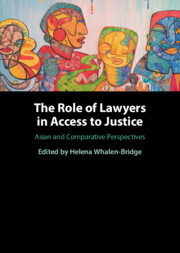Book contents
- The Role of Lawyers in Access to Justice
- The Role of Lawyers in Access to Justice
- Copyright page
- Dedication
- Epigraph
- Contents
- Figures
- Tables
- Appendices
- Contributors
- Foreword
- Acknowledgements
- Abbreviations
- 1 Understanding and Comparing Access to Justice
- Part I Access to Justice in Asia
- Part II Comparative Perspectives on Access to Justice
- 13 Access to Justice and an Islamic Ethic of Justice
- 14 Lawyering in Indonesia’s Religious Courts: Legal Aid, Procedural Justice, and Pragmatism
- 15 Access to Justice and Legal Aid in the Syariah Courts in Malaysia: A Colourful but Threadbare Patchwork System
- 16 The Syariah Court of Singapore: Achieving a More Formal Access to Justice
- 17 Access to Justice in Israel: Rights, Legal Aid, and Pro Bono in a Lawyer Dominant Environment
- 18 Vuk’uzenzele – Arise and Act: Lawyers and Access to Justice in South Africa
- Index
14 - Lawyering in Indonesia’s Religious Courts: Legal Aid, Procedural Justice, and Pragmatism
from Part II - Comparative Perspectives on Access to Justice
Published online by Cambridge University Press: 29 September 2022
- The Role of Lawyers in Access to Justice
- The Role of Lawyers in Access to Justice
- Copyright page
- Dedication
- Epigraph
- Contents
- Figures
- Tables
- Appendices
- Contributors
- Foreword
- Acknowledgements
- Abbreviations
- 1 Understanding and Comparing Access to Justice
- Part I Access to Justice in Asia
- Part II Comparative Perspectives on Access to Justice
- 13 Access to Justice and an Islamic Ethic of Justice
- 14 Lawyering in Indonesia’s Religious Courts: Legal Aid, Procedural Justice, and Pragmatism
- 15 Access to Justice and Legal Aid in the Syariah Courts in Malaysia: A Colourful but Threadbare Patchwork System
- 16 The Syariah Court of Singapore: Achieving a More Formal Access to Justice
- 17 Access to Justice in Israel: Rights, Legal Aid, and Pro Bono in a Lawyer Dominant Environment
- 18 Vuk’uzenzele – Arise and Act: Lawyers and Access to Justice in South Africa
- Index
Summary
This chapter analyses the practice of lawyering in Indonesia’s religious courts and focuses on the role that lawyers play in the creation of justice. The chapter also seeks to explore the extent to which the state’s programme of providing legal aid has contributed to the realization of justice for litigants, particularly poor people. The chapter argues that while some litigants in Indonesian religious courts appear to benefit from lawyer strategies tailored to particular disputes, there is evidence that lawyer pragmatism, in which lawyers are more concerned with fees for their legal assistance to litigants than with respect for law and justice, interferes with the accomplishment of justice for the client. The bureaucratic orientation of first instance religious courts, one that prioritizes procedural justice, also acts as a barrier to justice, because it limits lawyers’ contributions to a well-informed legal decision. Bureaucratization also poses obstacles to access to justice for poor persons in the context of legal aid, because undue demands for documentation from legal aid applicants creates opportunities for corruption and cuts off the most vulnerable applicants.
- Type
- Chapter
- Information
- The Role of Lawyers in Access to JusticeAsian and Comparative Perspectives, pp. 260 - 275Publisher: Cambridge University PressPrint publication year: 2022



